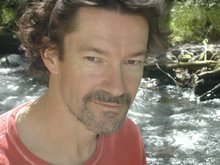After enduring a number of lengthy and largely unproductive sessions sitting on hot, stationery, idling buses waiting for something to happen, the participants in the Second Annual SERCh competition arrived at Oak Ridge National Labs for the evening festivities. Posters were carefully pinned up and the competition furtively scanned. The next agenda item was a tour of one's choice and, having seen the neutron spallation source (spectacular) last year, and having seen a lot of nanoscience stuff (it's really not that special looking), I chose a presentation on super-hydrophobicity. That means stuff that hates water in the worst possible way. Turns out that most materials are relatively hydrophilic - likes water to some degree - so hydrophobic is comparatively rare. Grease is the material we all confront daily in doing the washing up. A super-hydrophobic material is one that makes water bead up into an almost perfect sphere. Our host showed some interesting examples of materials that ranged from the highly engineered to naturally occurring diatomaceous earth. Some amusing little demos were very convincing as to the efficacy of these materials. Trousers made from this kind of stuff would eliminate the need for umbrellas. The group has also been working on transparent coatings; imagine driving in a rainstorm without need for wipers.
After dinner, we were serenaded by a presentation from Jim Roberto of Oak Ridge on energy challenges for the 21st century. The thesis of the talk was that energy is the number one defining issue facing society today. No argument here. He presented matter-of-factly the kinds of data that intelligent, thoughtful people will tend to accept without argument: fossil fuels are not increasing; climate change is a reality. I wanted to stop him and ask why it is that so many wish to be in denial on this. He then laid out the avenues being followed at Oak Ridge and its partners. Solar, cellulosic ethanol, batteries and nuclear (fission and fusion) featured prominently. Notably fuel cells and hydrogen did not. I asked him about this. The response revealed something of the bias that inevitably accompanies these discussions of energy solutions. Quite correctly he pointed out that hydrogen is not a power source but needs to be created; and if there are decent batteries then the need for hydrogen and fuel cells is obviated. Clearly his belief is that "decent" batteries will be made. "Decent" means about an order of magnitude or more improvement over today's batteries. Given the rate of progress over the past thirty years one wonders about the reality of this. A "perfect" battery would perform like a gas tank in terms of weight and time of recharge. Given that the prototype Tesla's battery pack weighs 400 kilos compared with a gas tank's 50 kilos, this seems like an impossible dream.
The pros and cons of all the non-fossil-fuel sources can be debated endlessly. What is not arguable is that the magnitude of the challenge is mammoth. Mr. Roberto's concluding words were sobering. Incremental improvements will not suffice he said, meaning that major breakthroughs are required. The trouble is that science advances mostly on incremental breakthroughs, with only occasional and unpredictable giant leaps intervening. Even when they occur, high-temperature superconductivity being a dramatic example, benefits to society do not necessarily follow. After the giddy talk of levitated railways and endless repetition of the fact that liquid nitrogen was cheaper than milk in the early days of the high-temperature superconductor discovery, decades have now passed and little is to show for all the wonderful science.
This administration has allocated a lot of money to new energy sources. Unfortunately it is impossible to legislate breakthroughs.
Scienceblogs is shutting down
8 years ago





No comments:
Post a Comment